- Home
- Catherine Coulter
KnockOut Page 8
KnockOut Read online
Page 8
“Sheriff, I appreciate your wanting to protect us, but Blessed is out there, mending his arm, making his plans. Autumn and I must leave. We’ve got to stop at the B-and-B and pack our things. I do thank you for what you’ve done for us, Sheriff.”
“You’re welcome, but I’ve just begun to fight. Now, I’ll take you to the B-and-B. While you’re getting your stuff together, I’ll make some calls. We’re staying together, Joanna, get used to it.”
15
NORTHEAST WASHINGTON, D.C.
Sunday, late afternoon
Buzz Riley looked one last time at the bed he and his wife, Eloise, had shared for more than thirty-six years. He’d never been gone from home for long since she died of ovarian cancer the year before. He missed her every single day, a steady ache. Was the ache less than it had been six months ago? He didn’t know. His three kids worried about him, and hovered. At first it was good, but soon it was driving him nuts. He figured out they’d made a schedule to see him, especially on the weekends, and that drove him nuts too. He tried to tell them he needed time alone, to reflect, to remember, to enjoy fishing in his new fifteen-foot Blue Fin Dory, but they wouldn’t pay any attention. One of his kids and some of his grandkids were always with him, the kids pressed against his back at the center console.
He fastened his ancient army duffel bag, checked to see that all the kitchen appliances were turned off, something Eloise had trained him to do, locked the front door, and carefully set the house alarm. He walked to his 2007 blue Chrysler Sebring, the first convertible he’d ever owned. They’d bought it from their mail carrier—only nine thousand miles on it—a year before Eloise died. She loved to ride around with him with the top down, laughing like a teenager sometimes, until one day she stuck her head out the side and an insect hit her front teeth. Buzz grinned at the memory of her shriek. He could still see her scrubbing her fingers manically over her teeth, trying to find a Kleenex.
He tossed his duffel into the passenger seat and slid across the soft black leather, closed the door. He patted the dashboard, still looking good as new, since he kept his baby cleaned and polished inside and out. He loved this car, only wondered in that moment if the damned thing had taken some of Eloise’s place in his affections.
“Nah,” he said aloud, and turned the key in the ignition.
Nothing happened. The engine didn’t even turn over.
He centered the steering wheel and turned the key again.
There was a small grinding noise that didn’t sound good, but then the engine roared to life, hummed smooth, and happy. He gave it some gas, listened to the sweet music. “Ah, there you go, beautiful.”
Buzz backed out of his driveway slowly because the neighborhood was always hopping, kids playing in the street, riding bikes. Didn’t matter if it was nearly seven o’clock in the evening, if it was still light there was action.
He waved to a couple of teenage boys who looked like they were going to smoke dope the minute he was out of sight, and they waved back. He was a retired cop, seven years now, but still a cop, and they knew it. His fingers itched sometimes to grab the little yahoos by the scruffs of their necks and shake some sense into their buzzed teenage heads.
He took a last look at his house, wondered how long it would be until he was home again. He knew he had no choice but to leave, with those crazy loons from the bank out for his hide—that young girl, Lissy, especially. Mr. Maitland had told him Lissy was probably sprung by the guy driving the getaway car, and confided that Dillon Savich would be taking over the case. Buzz liked him. Mr. Maitland treated Buzz like he was still a cop, even thanked him for saving Savich’s life.
Buzz had been to the Caribbean only once, with Eloise, on a cruise they’d hated, what with all his fellow cruisers running like pigs to the trough, and the threat of a hurricane, which, thankfully, hadn’t materialized.
He figured if he got bored on Aruba, he could always island-hop—after all, he was on leave with pay. Island-hopping, that might be good, but not if it meant being stuck on a rocking boat for seven days. At least he’d get a break from his kids cluttering around him all the time, trying to feed him, siccing his grandkids on him. It had been a zoo with them since he’d nearly bought the big one in the bank robbery. Buzz hadn’t called any of them to tell them he was leaving. Nope, he’d sent a blanket e-mail, and hadn’t answered any phone calls. He’d send everybody postcards.
The Sebring wasn’t running right. He had noticed some sputtering earlier, and now it was skipping, running rough. Whatever it was, it was getting worse. Maybe he shouldn’t drive the car to the airport. He had time to leave it at Jimmy’s—yeah, that’s what he’d do. He pulled out his cell phone and called Jimmy at home, told him he was going to leave it, and called a taxi.
Buzz switched lanes and drove over to Pepper Street, down a couple of blocks, and pulled into his friend Jimmy Turly’s auto shop, Honest Abe’s Repairs. Buzz once asked him if there really was an Abe, but Jimmy said his mom told him it had a good sound to it, trustworthy and all.
Buzz left his convertible at the tail of a row of other broken-down cars, left the keys on top of the front driver’s-side tire, and climbed into the taxi that had pulled up sooner than he expected. They made it to Reagan Airport in under an hour. His plane wasn’t late—a miracle—and he checked his bag and made it through security without having to strip to his shorts or empty his carry-on. He boarded his 737 to Aruba, a flat island, he’d heard, with lots of casinos and white beaches. He didn’t like to gamble, but he did like to lie in the sun. No one could ever tell he had a tan, he was already so dark, but he liked the idea of just lying in the sand and listening to the waves break. He could still feel the mad rush of adrenaline and the pounding fear when that maniac stuck his .38 into his ear, and the leap of joy and excitement when he could finally fight back. And he’d made it, with Dillon Savich’s help, even managed to shoot that woman who was leading the gang. In thirty years as a cop he’d never come that close to dying, and had never had to kill someone. The Washington Post had called him a hero, run his picture with Savich standing next to him, looking like one mean dude, despite his grin. At least he was alive, and although Eloise was gone, it felt wonderful.
He smiled. What an experience. It had changed something in him, he thought, made him feel more involved again in what people were doing around him, what they thought, how they felt. He liked it. He realized it felt vaguely familiar.
Buzz sat in a window seat, glad the seat next to him was still unoccupied, and looked out into the dying day when he noticed a closed utility door next to their gate slowly open. A young man, dressed in jeans and a gray T-shirt, stuck out his head. To Buzz’s experienced eye, he looked furtive, like he was somewhere he shouldn’t be, wanting to do something he shouldn’t be doing. What was this all about? The young man looked straight up at the plane, and Buzz would swear the young guy looked straight at him, although Buzz doubted that was possible. He saw something change in the boy’s expression. He turned to speak to someone still inside, and suddenly Buzz clearly saw Lissy Smiley come out from behind him. He’d seen her up close the day of the robbery when Savich had pulled her ski mask off, stared at her for some time. No doubt in his mind it was her, even though he couldn’t see her crazy dark eyes from here.
He knew why the two of them were here. They’d come to kill him. But they were too late.
He wanted to wave his fist at them, yell and laugh at them that he was safe. Then Buzz wondered how they followed him here, remembered the trouble with his car. Had they rigged it to break down on the side of the road? Or to blow up? Had that taxi arriving early saved his life? He quickly turned his cell back on and dialed Dillon Savich, but there was no answer. He left a message.
Buzz watched the two young people fade back into the terminal, watched the utility door automatically close. He continued to ignore the flight attendant and dialed Mr. Maitland. He didn’t want to take a chance of Honest Abe’s blowing up, Jimmy along with it.
; 16
TITUSVILLE, VIRGINIA
Sunday evening
Joanna and Autumn wore clean jeans and T-shirts, and probably clean socks on their feet. Ethan thanked the Lord he had convinced them to unpack, to stay with him at least while his deputies were out searching for Blessed. But he hated waiting. He hated not knowing what he was up against.
After a dinner of macaroni and cheese with a side of peas and a salad Joanna made without anyone asking for one, he set Autumn in front of the TV in his bedroom and took Joanna to the living room. “Sit down.”
She said, “Why don’t you throw that sweatshirt away? It’s got a hole under the right arm and it’s all frayed around the neck. I know, I know, you’re a guy and you’ve worn that sweatshirt since you were sixteen.”
“Seventeen, actually.”
“And why don’t you have shoes and socks on? You’ll get splinters.”
Ethan put his feet up on the coffee table, arched an eyebrow at her.
She said, “I finally tossed a Fort Lauderdale T-shirt last year a boy bought me when I was eighteen.”
“There you go. Tell you what, I’ll be strong and toss my sweatshirt if you tell me everything you know about these people.”
“That’s a beautiful piano. Do you play?”
Anything to divert him. He nodded. “Thank you. It was my grandmother’s piano. I’ll play some jazz for you later if you like. You know, Joanna, I’ve been patient with you, but now it’s time. I’m worried about my deputies as much as I’m worried about you and Autumn. What if they get close to Blessed? What will he do to them? Tell them to run off a cliff? You have to tell me what you know about him. I think you owe it to us, don’t you?”
She chewed on her lip, studied the inch of cold coffee at the bottom of the mug, then said, “I don’t want anyone to be hurt, I really don’t.”
He nodded. “Go on, then. Talk to me. Please.”
She put her feet up on the coffee table next to his, frowned at those two pairs of feet, put hers back on the floor, and said finally, “We were in the cemetery at my husband’s funeral, just a week ago. Blessed caught a young man hiding behind a gravestone. He had a camera and was taking pictures, like a Jimmy Olsen cub reporter. Blessed went into a rage, screamed at the kid, ‘Well, if it isn’t little snotty-nosed Nat Hodges,’ and jerked him to his feet, looked into his eyes—the young man never said a word. Blessed told him to drop his camera and stomp on it. Nat Hodges did it, no hesitation at all. At first I thought he was just scared to death, but then he simply stood there, all still and quiet. Blessed laughed at him and started making him do things, like elbow-crawl on his chest, rip off his shirt, rub dirt in his hair, humiliating things. The boy didn’t seem to be there anymore. He was completely in Blessed’s control, just like Ox was last night.
“Then Grace said, ‘Stop it, Blessed, we’ve got guests and we’re burying Martin,’ and Blessed huffed out in a pissed voice, ‘Can’t have the little scheiss taking pictures.’ Then he shook the kid until his head snapped back. I remember I took a step toward them, but Grace said in my ear not to worry, that Blessed was just bringing the boy back, something I really didn’t understand. But the boy seemed to wake up.
“Then Blessed grabbed the kid by the collar and told him he was going to run back to his boss at the newspaper and tell him he quit. And he said, ‘If I catch you around here again, I’m going to put you in one of those graves, you hear?’
“I remember the young guy was moaning, said his head hurt. I watched him run, just like Blessed told him to, trying to hold his head at the same time. I watched Blessed take the smashed camera and throw it into the open grave. He said, ‘Now Martin can take pictures of all the saints.’ He turned to his mother, Shepherd, and she nodded, didn’t say a word, simply nodded, and it was over.
“I was so shocked, so terrified, I stood there like a stone, my hand over Autumn’s eyes. She was plastered to my side. I could hear her breathing.” Joanna stopped a moment, looked over his left shoulder toward the grand piano.
“Since it happened, I’d been thinking about it, though, what we saw, and it seemed that being shaken or hit, or jarred, is what brought the boy back to himself. That’s what I was trying to do last night with Ox. I have no idea what Ox would have done, though, if you hadn’t hit him so hard. No, I do know. He would have killed us to get Autumn.”
He nodded. “It was like he was hardwired to do whatever he had to do to get his hands on her. Dr. Spitz still won’t accept that Ox was under the control of someone else. He checked him for drugs and alcohol, and he wants Ox to have an MRI and an EEG, to see if his behavior was the result of a seizure or a brain tumor.
“You spoke about a cemetery, and you mentioned your husband, and you were there for his funeral. Tell me about the rest of the family, and why you were there with them.”
“I hadn’t met any of them before last week.” She didn’t say anything else, just began to worry her thumbnail.
Ethan said, “Blessed—his name makes me think of some sort of weird-ass preacher for one of those off-the-wall religions that doesn’t have much to do with God.”
“All their names are like that. For example, Grace.”
“Grace? Yes, you mentioned his whispering to you. Blessed and Grace? What, they’re brothers?”
“Yes, Martin’s brothers.”
“Okay, what can you tell me about Grace?”
“Grace is thin as a rail, holds himself real quiet. But you’re always aware of him when he’s around. He’s creepy.”
She started to say something again, and he sat forward, touched her wrist. “What? Say what you have to say.”
“I could be wrong, really wrong.”
“What, Joanna?”
“I only heard Grace speak a very little bit. His voice was soft, sort of hollow, almost dead.” She shuddered. “That sounds ridiculous. I can’t really explain it, but—”
“But what?”
“Ox, last night, when he spoke—”
He waited.
“Ox sort of sounded like Grace. Not all soft and quiet like Grace, but the cadence of his voice.
“It sounds crazy, I know. It’s not that it was Grace’s voice, but it was the way he spaced out his words, like I said, the cadence—it was so familiar.”
17
LATER, HE THOUGHT, he’d visit that snake pit later. Ethan knew there was even more; he knew it. He had to keep her talking. Maybe all of it would come out at last.
“Are you ready to tell me where this happened? Where they live?”
“In a strange little town called Bricker’s Bowl. It’s near the Alabama border.”
“Bricker’s Bowl? I’ve never heard of it.”
“It really is more a bowl than a valley, curves up on both sides with houses marching right up the hills. I guess, from the air, what with the houses on the surrounding hills, it does indeed look like a bowl. Their family’s been there for generations, his mother told me.”
“Tell me about Ma.”
“She’s rich. She, Blessed, and Grace live in a huge Victorian mansion, filled with expensive antiques, mostly nineteenth-century English, and lots of manicured grounds. They have a six-car garage, although I never saw the cars inside, so I can’t tell you what they are. They’ve got their own private cemetery.
“She’s very proud of their wealth. She loves to show you every antique in the place—and there are a lot of them, since there are maybe fifteen rooms. She told me this is all due to her husband’s talent.”
“Was the husband around?”
She shook her head. “He’s dead. When she first told me about him, I thought she was batty, but now I’m not so sure. She confided in me that Theodore had the most useful talent in the family. That’s what she called it—a useful talent.”
Ethan found himself sitting forward. “What could Theodore do?”
“She said he had this beautiful gift, discovered quite by accident when he was in Las Vegas once and played the slot machines. He
won.”
“Yeah. So what?”
“Evidently he won a great deal. Actually, she told me he never lost.”
“What? You’re telling me Theodore Backman was some sort of diviner?”
She had to grin, but it fell off her face fast enough. Ethan was staring at her, an eyebrow arched.
“As Shepherd explained it, where the reels stop is supposed to be random, but somehow Theodore could make the reels stop where he wished. She said he talked to the slots.”
“Oh, come on, Joanna. You mean he had this force field that reacted to the reels themselves? Or he had this internal magnet that brought the reels to a stop? What?”
“Look, I thought it was nuts too, even though Mrs. Backman told me he’d made them all rich.”
“It sounds like one of the crazy stories they’d tell us in the DEA as a cover for illegal income,” Ethan said. “It never flew in court. How’d he die?”
“Mrs. Backman told me he walked out of a casino in Reno and a mugger killed him. He hit the mugger with his cane, but the mugger hit him on the head with a hammer and left him to die, which he did.”
“A cane? How old was Theodore when the mugger got him?”
“Mid-seventies.”
“How old is Blessed? Grace?”
“Blessed is in his fifties. Grace is a bit younger, late forties, maybe.”
“So you’re telling me Blessed and Grace and their mother—what’s her name?”
“Shepherd.”
“Like the guy on FOX News?”
“More like the guy who herds the sheep. She told me, all preening, that her husband gave her that name, the mother of his small flock. I wondered what her birth name was, but I was too freaked out to ask.”
“Okay, so these folk say they’re rich because of a man who could line up three cherries. Now the million-dollar question. How did you hook up with these people? If they’re your husband’s family, why did you only just meet them?”

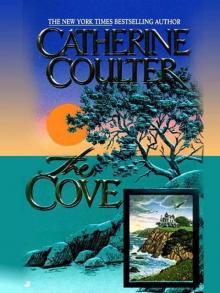 The Cove
The Cove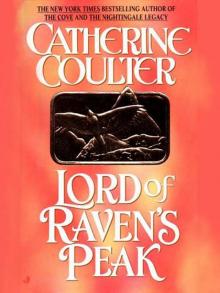 Lord of Raven's Peak
Lord of Raven's Peak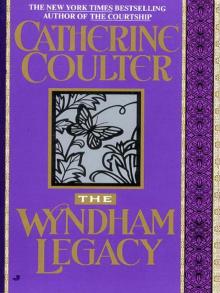 The Wyndham Legacy
The Wyndham Legacy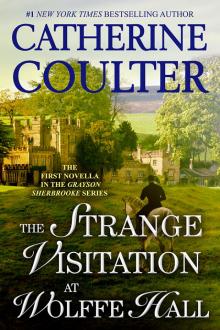 The Strange Visitation at Wolffe Hall
The Strange Visitation at Wolffe Hall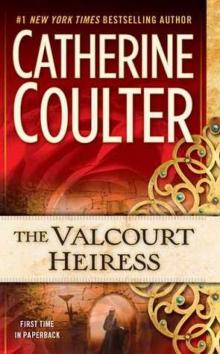 The Valcourt Heiress
The Valcourt Heiress Bombshell
Bombshell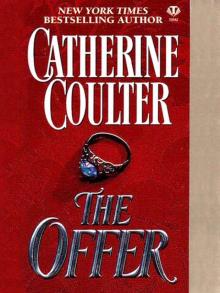 The Offer
The Offer The Edge
The Edge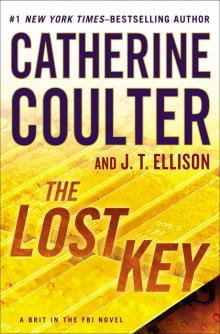 The Lost Key
The Lost Key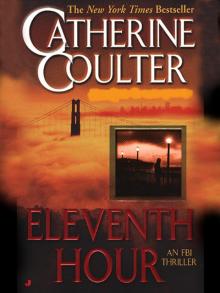 Eleventh Hour
Eleventh Hour Blindside
Blindside Devil's Daughter
Devil's Daughter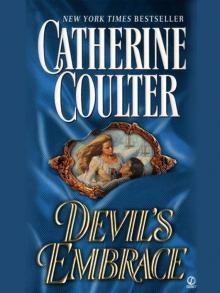 Devil's Embrace
Devil's Embrace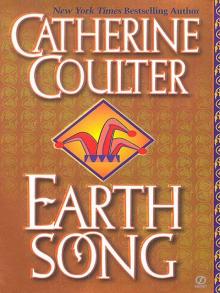 Earth Song
Earth Song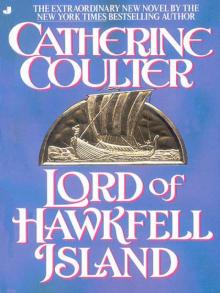 Lord of Hawkfell Island
Lord of Hawkfell Island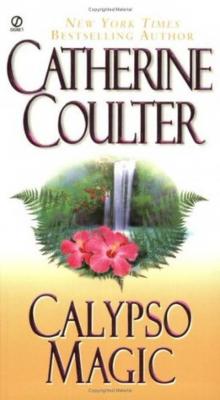 Calypso Magic
Calypso Magic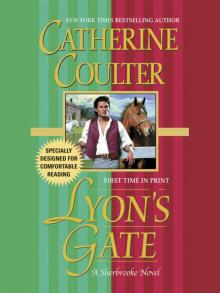 Lyon's Gate
Lyon's Gate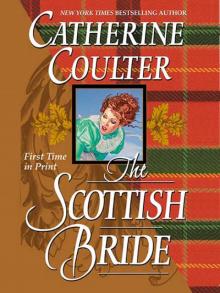 The Scottish Bride
The Scottish Bride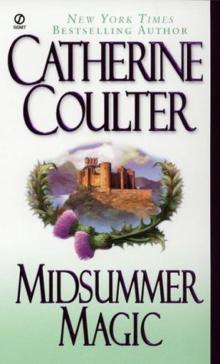 Midsummer Magic
Midsummer Magic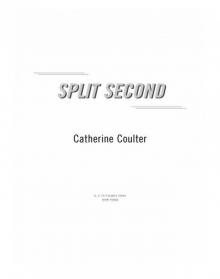 Split Second
Split Second Enigma
Enigma Blowout
Blowout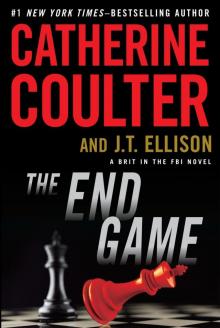 The End Game
The End Game Double Take
Double Take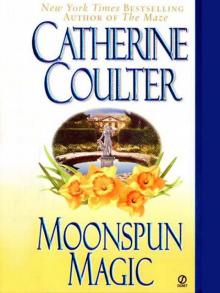 Moonspun Magic
Moonspun Magic The Courtship
The Courtship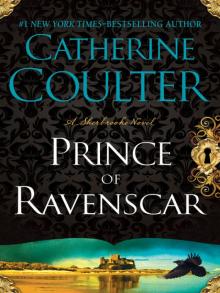 Prince of Ravenscar
Prince of Ravenscar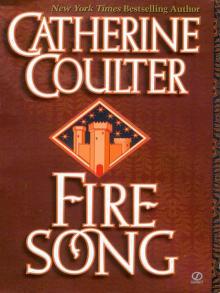 Fire Song
Fire Song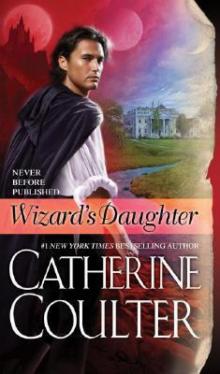 Wizard's Daughter
Wizard's Daughter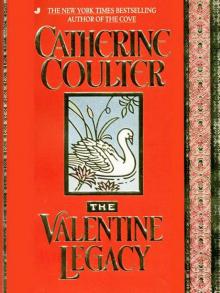 The Valentine Legacy
The Valentine Legacy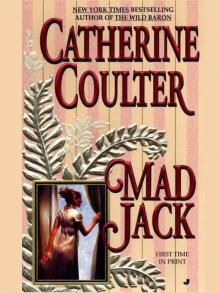 Mad Jack
Mad Jack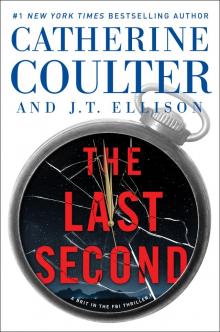 The Last Second
The Last Second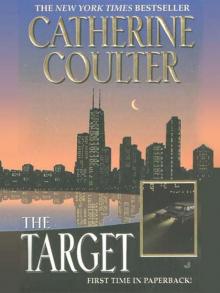 The Target
The Target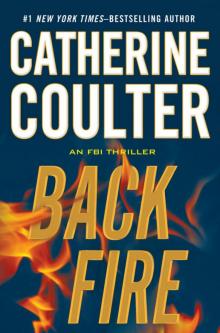 Backfire
Backfire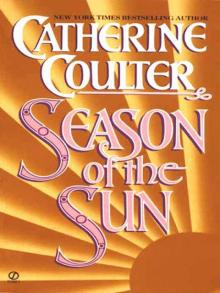 Season of the Sun
Season of the Sun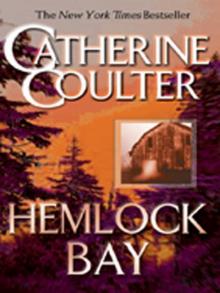 Hemlock Bay
Hemlock Bay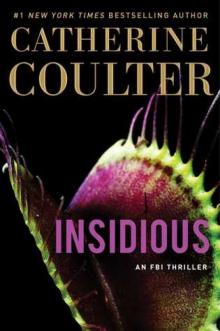 Insidious
Insidious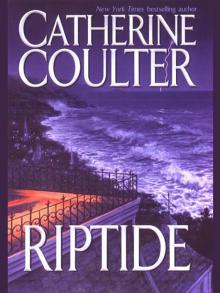 Riptide
Riptide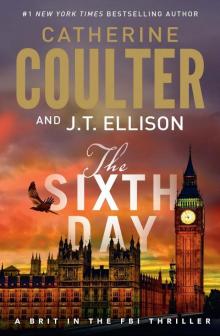 The Sixth Day
The Sixth Day Secret Song
Secret Song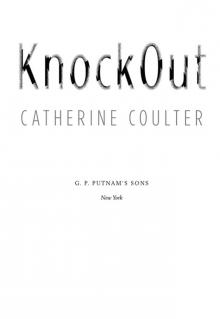 KnockOut
KnockOut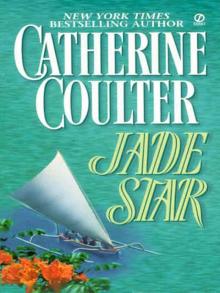 Jade Star
Jade Star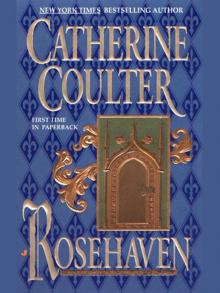 Rosehaven
Rosehaven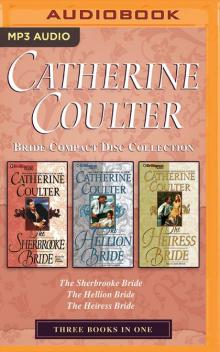 The Hellion Bride
The Hellion Bride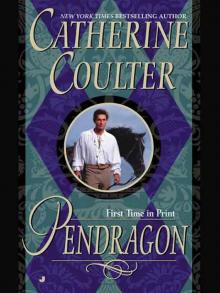 Pendragon
Pendragon Vortex
Vortex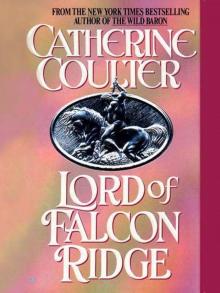 Lord of Falcon Ridge
Lord of Falcon Ridge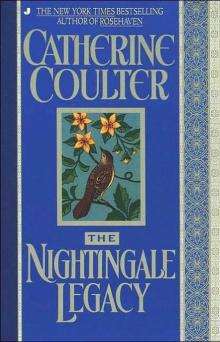 The Nightingale Legacy
The Nightingale Legacy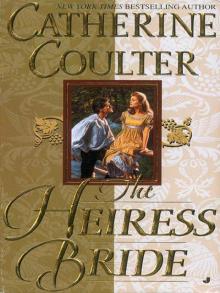 The Heiress Bride
The Heiress Bride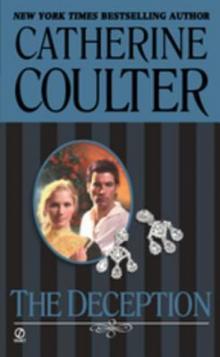 The Deception
The Deception The Maze
The Maze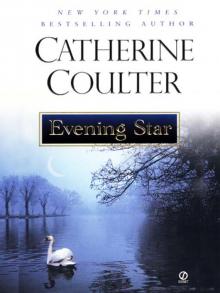 Evening Star
Evening Star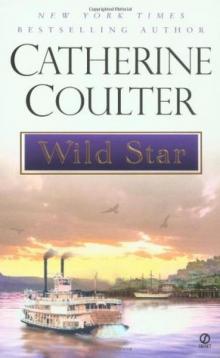 Wild Star
Wild Star The Final Cut
The Final Cut Paradox
Paradox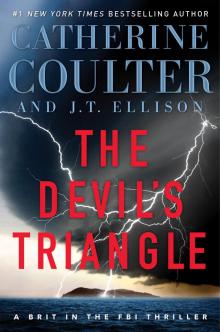 The Devil's Triangle
The Devil's Triangle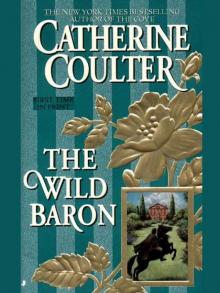 The Wild Baron
The Wild Baron Point Blank
Point Blank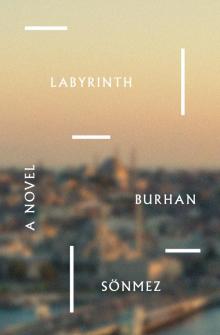 Labyrinth
Labyrinth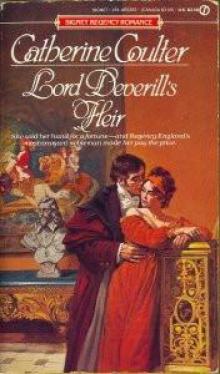 Lord Deverill's Heir
Lord Deverill's Heir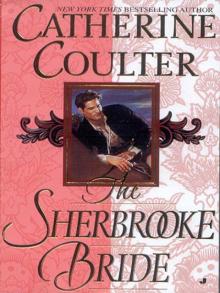 The Sherbrooke Bride
The Sherbrooke Bride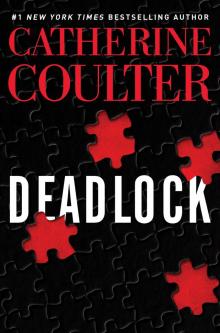 Deadlock
Deadlock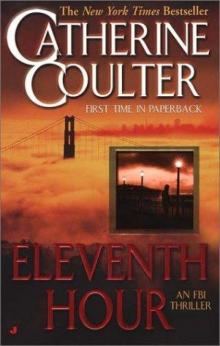 Eleventh Hour f-7
Eleventh Hour f-7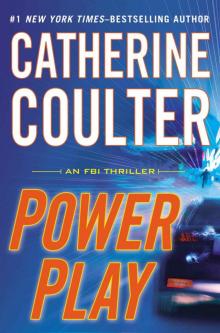 Power Play (An FBI Thriller)
Power Play (An FBI Thriller)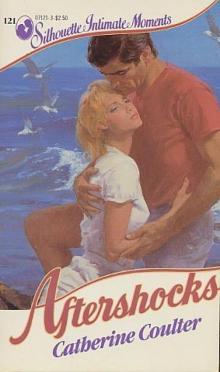 Aftershocks
Aftershocks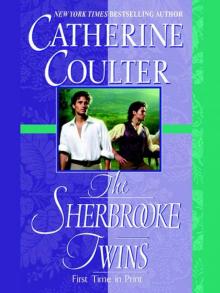 Sherbrooke Twins tb-8
Sherbrooke Twins tb-8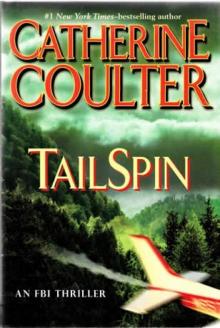 Tail Spin ft-12
Tail Spin ft-12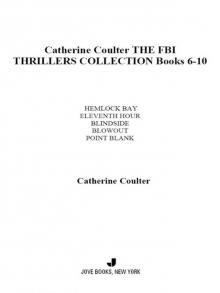 The FBI Thrillers Collection
The FBI Thrillers Collection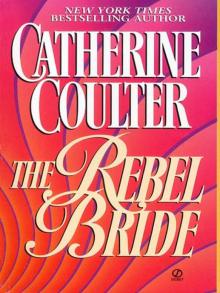 The Rebel Bride
The Rebel Bride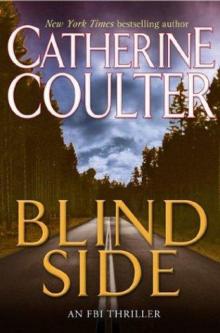 Blindside f-8
Blindside f-8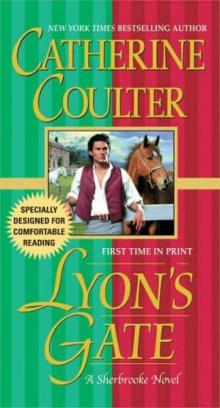 Lyons Gate tb-9
Lyons Gate tb-9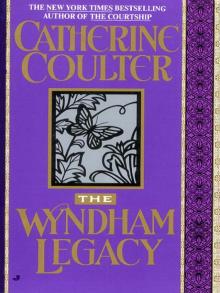 Wyndham Legacy
Wyndham Legacy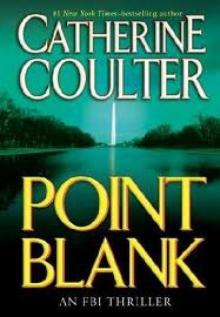 Point Blank f-10
Point Blank f-10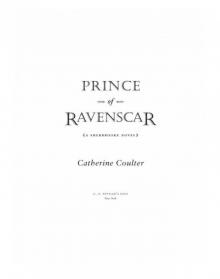 The Prince of Ravenscar
The Prince of Ravenscar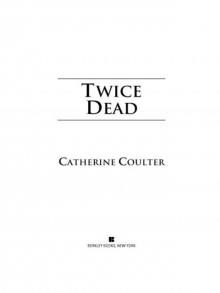 Twice Dead
Twice Dead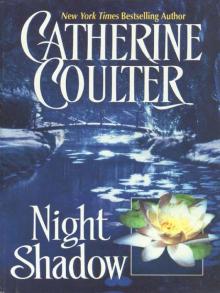 Night Shadow
Night Shadow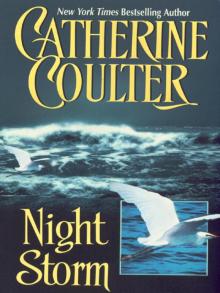 Night Storm
Night Storm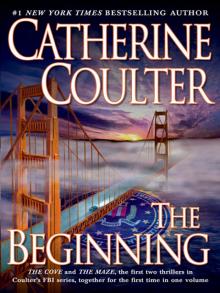 The Beginning
The Beginning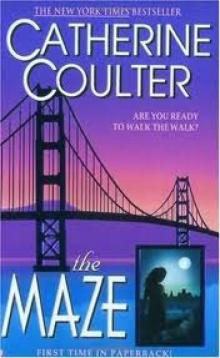 The Maze ft-2
The Maze ft-2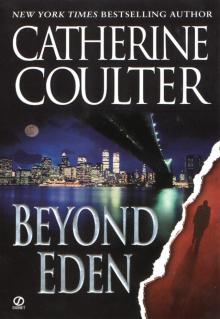 Beyond Eden
Beyond Eden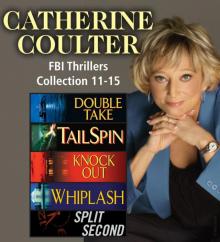 The FBI Thrillers Collection: Vol 11-15
The FBI Thrillers Collection: Vol 11-15 FALSE PRETENSES
FALSE PRETENSES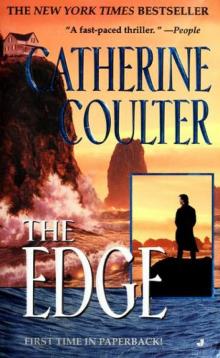 The Edge f-4
The Edge f-4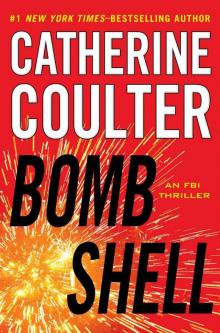 Bombshell (AN FBI THRILLER)
Bombshell (AN FBI THRILLER)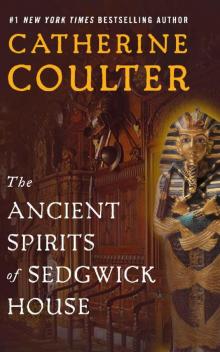 The Ancient Spirits of Sedgwick House (Grayson Sherbrooke's Otherworldly Adventures Book 3)
The Ancient Spirits of Sedgwick House (Grayson Sherbrooke's Otherworldly Adventures Book 3)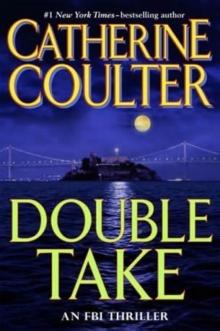 Double Take ft-11
Double Take ft-11 The Heir
The Heir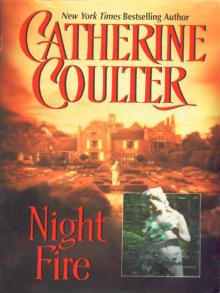 Night Fire
Night Fire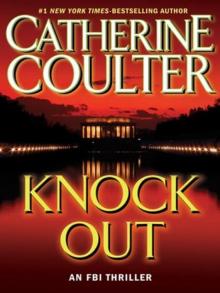 KnockOut ft-13
KnockOut ft-13 Hemlock Bay f-6
Hemlock Bay f-6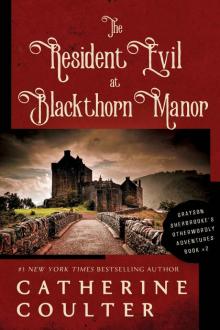 The Resident Evil at Blackthorn Manor (Kindle Single) (Grayson Sherbrooke's Otherworldly Adventures Book 2)
The Resident Evil at Blackthorn Manor (Kindle Single) (Grayson Sherbrooke's Otherworldly Adventures Book 2)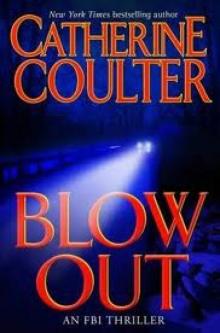 Blowout ft-9
Blowout ft-9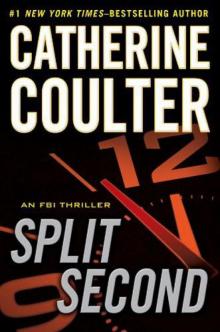 Split Second f-15
Split Second f-15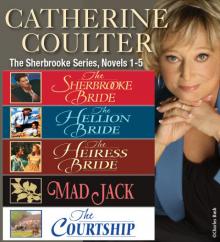 The Sherbrooke Series Novels 1-5
The Sherbrooke Series Novels 1-5 Impulse
Impulse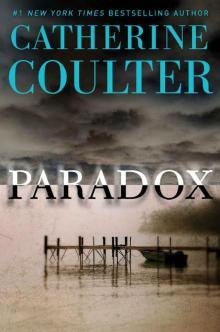 Paradox (An FBI Thriller Book 22)
Paradox (An FBI Thriller Book 22)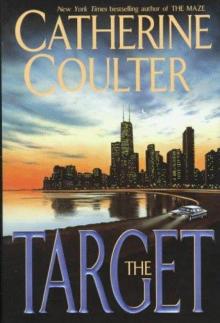 The Target f-3
The Target f-3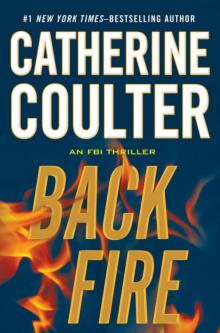 Backfire fst-16
Backfire fst-16 Born To Be Wild
Born To Be Wild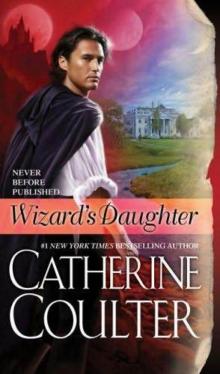 Wizards Daughter tb-10
Wizards Daughter tb-10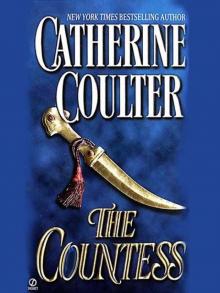 The Countess
The Countess